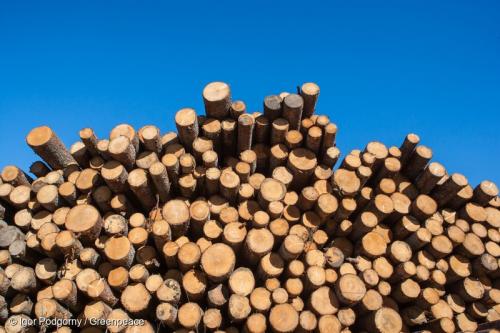Commission study makes pressing case for EU action on deforestation
Despite promises, Commission remains silent on EU plans to tackle deforestation
A long awaited European Commission study, released late on Friday, lays out policy options for the EU to tackle the impact on global deforestation caused by the trade in crop and animal products like beef, soy and palm oil. The study also points out the EU’s high level of meat consumption, its dependence on imported animal feed, and the inadequacy of controls on finance and investments flows as drivers of deforestation.

The EU’s failure to act to reduce its forest footprint is jeopardising chances of avoiding the worst impacts of climate change, warned Greenpeace. Although the Commissionhad promised to take a decision on a deforestation action plan, it has yet to announce how it intends to follow up on this study and what action, if any, will be taken.
Greenpeace EU forest policy director Sébastien Risso said: “Europe has ignored its role in global deforestation for long enough. The EU must act swiftly to ensure that the food we eat, the energy we use and the banks we save in are no longer destroying forests, fuelling climate change and trampling on indigenous peoples’ rights. It’s time for the Commission to break its silence and come forward with strong rules and policies to curb the EU’s forest footprint and support global efforts to halt deforestation.”
European governments and the European Parliamenthave repeatedly called on the Commission to develop an action plan on deforestation and to deliver on the goal of ending deforestation by 2020. On 5 March, again, at the last Environment Council, five EU countries called on the Commission to “propose an ambitious strategy to combat imported deforestation”.
The Commission study released on March 19th, recognises that “the EU is clearly part of the problem of global deforestation”, but can be part of the solution. It sets out a series of policy measures that could form the basis of an EU action plan on deforestation. In particular, these include:
● new legislative measures to ensure sustainable and deforestation-free agricultural supply chains, and oblige financial institutions to take action to eliminate the risk of deforestation resulting from financial investments;
● initiatives to encourage lower consumption of meat and dedicated actions to reduce imports of feed, such as soy, for the EU livestock sector by increasing vegetable protein production in Europe;
● a complete phase-out of crop-based biofuels by 2030 under the renewable energy directive;
● financial and technical assistance to help countries whose forests are at risk to meet their international commitments on forest protection, including by supporting sustainable agricultural production and supply chains, strengthening forest protection, securing the rights of indigenous and forest communities, and improving forest and land use planning, governance and law enforcement.
Agricultural expansion is responsible for 80 per cent of global deforestation, with devastating effects on the planet’s climate and biodiversity. Deforestation is also associated with violence and human rights abuses. Almost 40 percent of the land used to satisfyEU consumption is situated outside Europe.
Forests are essential for life on the planet. They guard against the worst effects of climate change byabsorbing and storing massive amounts of carbon dioxide, are home to a vast diversity of plants, animals and insects, and provide shelter and livelihoods for hundreds of millions of people.
The Commission also released a study on the environmental impact of palm oil consumption and on existing sustainability standards. In 2017, the EU imported over 3,410,000 tonnes of palm oil from Indonesia and over 1,781,000 tonnes from Malaysia. The oil palm and wood fibre sector is the biggest driver of deforestation in Indonesia and Malaysia. In Indonesia alone around 24 million hectares of rainforest was destroyed between 1990 and 2015 – an area almost the size of the UK.
Source: Greenpeace European Unit
- 317 reads
Human Rights
Conscience, Hope, and Action: Keys to Global Peace and Sustainability

Ringing FOWPAL’s Peace Bell for the World:Nobel Peace Prize Laureates’ Visions and Actions

Protecting the World’s Cultural Diversity for a Sustainable Future

The Peace Bell Resonates at the 27th Eurasian Economic Summit

Puppet Show I International Friendship Day 2020

